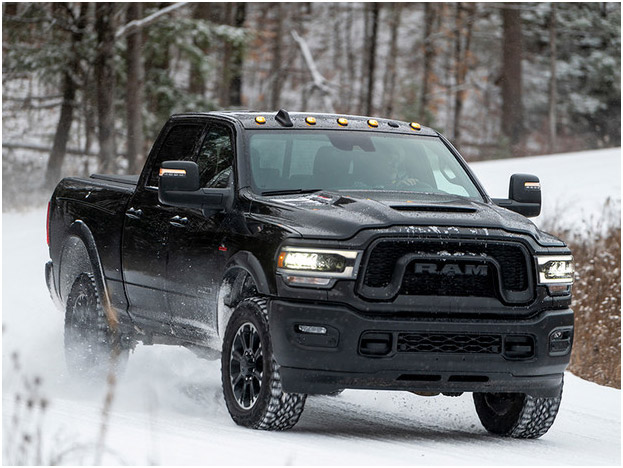It is essential that you get your car ready for the Canadian winter, but what steps do you need to take to winterize your ride? Find out in our winterizing guide.

Maintenance and repair are key to keeping your vehicle in good condition, especially as the weather turns colder. With colder weather, driving conditions can change, meaning that the way your car runs can be affected. From winter tires to general vehicle servicing in Laval, there are plenty of ways you can get your car ready for the colder season.
In this article, we're going to cover the preventive maintenance you can carry out on your car before winter, along with other winterizing tips and the reasons you need to winterize in the first place.
Let’s explore how you can winterize your vehicle.
Winter Vehicle Maintenance in Laval
Winter means wet, cold, and icy conditions. It also means getting your vehicle prepped for these harsher conditions. Whether you go to the service department at a car dealership in Laval, QC, to have your vehicle winterized professionally or you do it yourself, here are some things you need to do to winterize your vehicle.- Winter tires: You must change to winter tires in Quebec, Canada, by December 1 each year and have them on your vehicle through to March 15. All-season tires are not considered sufficient for the winters in Quebec, so you need tires with a good tread depth.
- Antifreeze: To avoid engine issues, remember to top up your engine coolant with winter-grade antifreeze to prevent the coolant from freezing.
- Battery: Cold weather can wreak havoc on car batteries, particularly if your battery is older or weaker. Make sure your battery is in good condition before winter sets in to avoid issues. If it needs replacing, an auto repair shop can help!
- Oil: In winter, lower-viscosity oil is always better. As a thinner oil, it can flow more freely in cold temperatures, keeping your engine nice and lubricated throughout the colder months.
- Defrosting and heating systems: For maximum comfort during winter, make sure that your defrosting and heating systems are in good working condition.
- Windshield wipers: Changing your windshield wipers over to winter wiper blades with winter-grade wiper fluid will ensure that they don't freeze when the temperatures drop.
- Lights: Carry out a vehicle light inspection, including headlights, taillights, and turn signals. With shorter days and more darkness during winter, all your lights must be working as they should to keep you and others safe.
- Brakes: It is recommended to check your brakes are working to an optimum level before winter. With icier roads and wetter conditions, brakes that don't function properly could lead to accidents. If you require brake repair, an auto repair service can help you out and keep you and others safe!
- Exhaust: Checking your exhaust system should come as part of your regular maintenance checks, but it is also a good idea to check before winter. If there are leaks, carbon monoxide can get into the cab. This is a deadly gas, so it's essential to protect yourself and your family from its effects.
- Tires: You will have already switched to winter tires, but another tire check to make is to examine the tire pressure. Tire pressure drops more rapidly during winter, so ensure you carry out the checks regularly during colder months.
- Regular maintenance: While there are specific winter checks you should do, it’s also essential that you don't stop carrying out all your other maintenance checks in the winter months.
- Rust prevention: Due to the corrosive nature of road salt, rusting is more likely to occur in winter. If you want to protect your vehicle from rust, consider applying rust protection to fend off that corrosive road salt.
- Emergency kit: Lastly, during winter, there’s a risk of being stuck and stranded due to snowy conditions. In these cases, you’ll need a few things already in your car, just in case. An emergency kit should include a flashlight, blankets, non-perishable food, first aid essentials, and basic tools. You should also have a snow brush and ice scraper in your car and traction mats, sand or cat litter in the event that your vehicle gets stuck in the snow (all these items help the vehicle get traction and move out of its stranded position).
Why Do I Need to Winterize My Vehicle?
In Canada, we're used to incredibly harsh winters, particularly in the northernmost parts of the country. And so, winterizing your vehicle is simply a way of ensuring that your vehicle runs safely and remains in good condition during these harsh winter months.Winterizing means safety for you and other drivers on the road. By checking lights and brakes, you can ensure that you don't increase the risk of accidents that could harm you and others around you.
You also protect yourself from getting stranded by checking things like battery condition, oil levels, and more. And even if the worst happens and you do get stuck, you will already be prepared with emergency supplies to wait out the cold.
As we approach winter, consider getting ahead on this checklist of things to do to winterize your vehicle. That way, if you need any major repairs, everything is sorted out before the cold sets in. You can do most of the winterizing yourself, but if you are concerned or want a bit of extra guidance, remember that auto repair shops, like Desmeules Chrysler, can also lend a hand with their mechanical expertise.
Looking for Vehicle Servicing in Laval to Get You Ready for Winter? Contact Desmeules Chrysler Today
Are you looking for professional vehicle servicing in Laval? Come down to Desmeules Chrysler today. We're a trusted and experienced car dealership in Laval with a full auto repair service, and we can help you get your vehicle as prepared as possible for the cold Canadian winter.Get in contact today to find out more.
